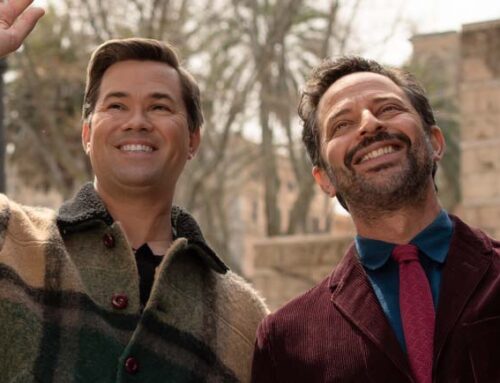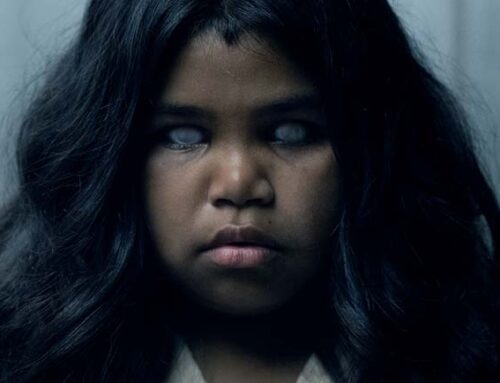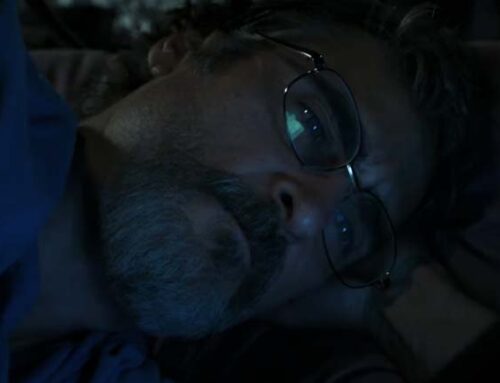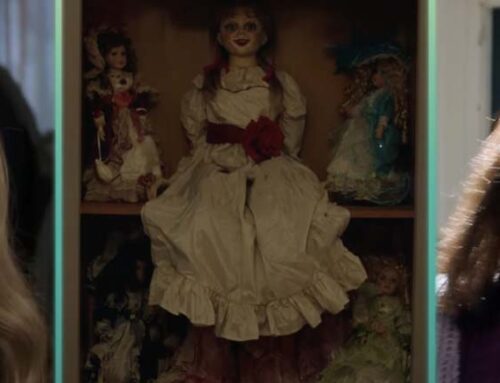CARMILLA, based on the 1872 vampire novel of the same name, takes a story that is over a century old and gives it fresh blood. The original Carmilla, published as a serial, was originally released almost thirty years prior to Bram Stoker’s Dracula. And yet, the 2019 film CARMILLA has a decidedly modern, beautifully feminist, and feminine, edge.
Lara (Hannah Rae) lives in the quintessential gloomy English country home, with her quintessential gloomy English governess, Miss Fontaine (Jessica Raine). Lara is repressed, as so many young women of the era were, and highly sheltered. Miss Fontaine goes as far as binding her left hand behind her back in order to prevent her from writing with it or using it, as left handedness is a sign of the touch of the devil. Lara only has one “friend”, or so she hopes, the daughter of a friend of her father’s. However, their planned visit is cancelled at the last possible moment when the girl falls ill and is warned not to travel. Excruciatingly lonely, and hopelessly depressed, the only small joy Lara has is a gift from her father – a stole and broach that belonged to her mother, who passed when Lara was small.
Lara’s sadness is quickly broken up by panic and excitement, as a young girl around Lara’s age is found after a carriage accident, having suffered a concussion. No matter how much Miss Fontaine tries, Lara can’t contain her curiosity and after allowing her a few days of recuperation, she finds a way to visit with the girl. Her name — or the name Lara gives the mysterious girl, with no family and no history, is Carmilla (Devrim Lingnau). She is unspeakably pretty, and strange. Her strangeness only becomes more apparent as she recovers and begins to join the family for meals and lessons. She never prays, she never seems to eat, and she sleeps for large portions of the day and is awake much of the night. She doesn’t wear a cross as all the other young girls do. In all her mystery she has a strange, hypnotic pull on Lara, who very quickly finds herself exploring feelings she never would have imagined she’d have. The story of two young girls falling for each other seems picturesque and beautiful – but in a stuffy, conservative home, in the midst of sudden illness, and with all the eyes of the household on them, their love may not blossom into a full bloom.
CARMILLA is beautiful – every frame looks like it’s shot at golden hour, with soft warm sun almost seeming to glow through the cast. The intimate, sensuous shots of the cast and particularly the young girls draw you in close – almost as close as the macro shots of nature and food – the visceral, almost gruesome reality of the passage of time – something Carmilla herself will never have to face. Blood reds melt into soft cotton whites and pale blushing flesh to create a color palette that is undeniably romantic.
CARMILLA has the gravitas of a Masterpiece Theatre or BBC series – and there were times I wished it was presented that way instead of a film. I ached for more time with these young women, seeing them fall in love, and seeing Carmilla for who she really was. Unfortunately in the pacing of a feature film, it is hard to convey her story without unending exposition. It’s refreshing to see that this film takes almost the opposite route – much is left to the viewer’s imagination, and information is presented without an “endgame” in mind. When Miss Fontaine finds a book in Carmilla’s belongings, and shows it to the doctor, there is unease in both of their faces. Is the book a diary? Is it some kind of otherworldly relic? What it outlines to them isn’t made clear to us, but we can be certain it leads them to take action. While some viewers may find this style of storytelling frustrating because so much is left to the imagination, I found it exciting. There is nothing pandering about CARMILLA, and instead each plot point unfolds like petals of a flower without any help or guidance.
CARMILLA oozes sensuality, but not to the male gaze. CARMILLA is actively feminine and feminist – even the most racy of moments focuses more on breath on skin and the heat of bodies than it does on breasts or lips meeting. This film alone should be a poster child for allowing women to make films about women – it shows, and it makes all the difference in the world.
Young love is the ultimate theme of CARMILLA, but the deep, dark undertones of vampirism and something almost satanic color what could be a simple and almost silly love story into something serious, poetic, and piercingly beautiful.
10/10 stars
| CARMILLA | ||
| RATING: | UR | Carmilla (2019) | Trailer | Tobias Menzies | Jessica Raine | Greg Wise |
| Runtime: | 1 Hr. 34 Mins. | |
| Directed By: |
Emily Harris
|
|
| Written By: |
Emily Harris
|
|







